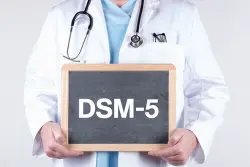OCD
What is Obsessive Compulsive Disorder ( OCD )?
Obsessive-compulsive disorder is a condition that is frequently mentioned on the internet. You do not need to have both obsessions or compulsions to meet criteria, however, usually people with the condition have both in some form. Unfortunately, these obsessions or compulsions take up time from daily life and negatively impact functioning. An example of this may be a person that is unable to leave their house for work until they perfectly arrange their silverware. There could be a strong feeling of anxiety regarding the arrangement of silverware, such as, if it is not arranged properly, it could put a close family member’s life in danger. By arranging the silverware, this anxiety is relieved

What Are The Criteria For OCD?
A. Presence of obsessions, compulsions, or both:
Obsessions are defined by (1) and (2):
- Recurrent and persistent thoughts, urges, or impulses that are experienced, at some time during the disturbance, as intrusive and unwanted, and that in most individuals cause marked anxiety or distress.
- The individual attempts to ignore or suppress such thoughts, urges, or images, or to neutralize them with some other thought or action (i.e., by performing a compulsion).
Compulsions are defined by (1) and (2):
- Repetitive behaviors (e.g., hand washing, ordering, checking) or mental acts (e.g., praying, counting, repeating words silently) that the individual feels driven to perform in response to an obsession or according to rules that must be applied rigidly.
- The behaviors or mental acts are aimed at preventing or reducing anxiety or distress, or preventing some dreaded event or situation; however, these behaviors or mental acts are not connected in a realistic way with what they are designed to neutralize or prevent, or are clearly excessive.
Note: Young children may not be able to articulate the aims of these behaviors or mental acts.
B. The obsessions or compulsions are time-consuming (e.g., take more than 1 hour per day) or cause clinically significant distress or impairment in social, occupational, or other important areas of functioning.
C. The obsessive-compulsive symptoms are not attributable to the physiological effects of a substance (e.g., a drug of abuse, a medication) or another medical condition.
D. The disturbance is not better explained by the symptoms of another mental disorder (e.g., excessive worries, as in generalized anxiety disorder; preoccupation with appearance, as in body dysmorphic disorder;
Specifiers For Diagnosing OCD
Specify if:
With good or fair insight: The individual recognizes that obsessive-compulsive disorder beliefs are definitely or probably not true or that they may or may not be true.
With poor insight: The individual thinks obsessive-compulsive disorder beliefs are probably true.
With absent insight/delusional beliefs: The individual is completely convinced that obsessive-compulsive disorder beliefs are true.
Specify if:
Tic-related: The individual has a current or past history of a tic disorder.
Treatment for this condition can include psychotherapy (specifically exposure and response therapy) and psychiatric medications. If you suspect that you or a loved one may be suffering from OCD, you can message a NeoPsych representative for consultation. If interested in a more formal evaluation, an appointment can be scheduled if there is availability and your insurance allows.
Obsessive Compulsive Disorder vs. Obsessive Compulsive Personality Disorder
Obsessive Compulsive Disorder is different from Obsessive Compulsive Personality Disorder. Often, people with OCD experience their symptoms as ego-dystonic (coming from outside of self and unwanted) and people with OCPD experience their symptoms as ego-syntonic (coming from inside and welcomed). What this means is that OCD is viewed by the people that have it as a disorder and causing difficulty in their life. People with OCPD may view themselves and their behavior as perfectly normal, and may not seek treatment for it.
Symptoms of OCD usually starts in the teen years. Symptoms can begin gradually and the themes of the condition can change or evolve over time. For example, an obsession may start off with fear of a close family member dying by a violent act. Within a few months the obsession can transform into fear of germs killing the same family member. These symptoms can worsen depending on environmental stressors.
Summary Of What Is Obsessive Compulsive Disorder (OCD)?
I hope the above information has helped illuminate what OCD is. If you are concerned that you meet criteria contact NeoPscyh by filling out the form at the bottom of the page or click the “Book A Discovery Call”. Remember, early intervention is recommended with therapy and/or medication management. If neither of these options are effective, TMS for OCD is an option.
